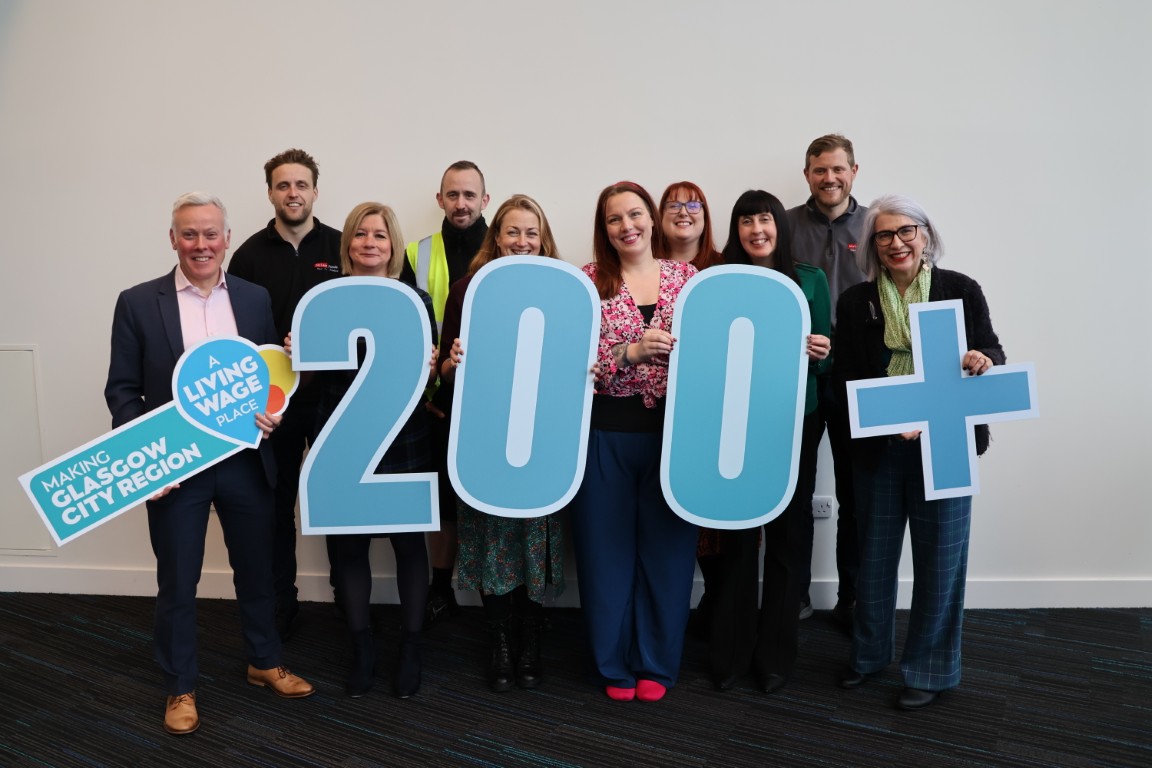Glasgow City Region is celebrating a major milestone this Living Wage Week after reaching its target of 200 new Living Wage accredited employers in the first year of its Living Wage Place campaign.
The campaign, launched in November 2024, made Glasgow City Region the first in Scotland to commit to becoming a Living Wage Place. Since then, more than 200 businesses have signed up, helping to uplift pay for almost 2,000 workers.
Susan Aitken, Leader of Glasgow City Council and Chair of the Glasgow City Region Cabinet, said: “Making sure employees are paid fairly for their work is at the heart of a more equal, stronger, and resilient economy.
“It’s really welcome that in our first year, 200 new employers have signed up to paying the real Living Wage. That’s a significant achievement and a reflection of the collaboration driving Glasgow City Region forward.
“Paying the real Living Wage has multiple benefits – it increases productivity, tackles in-work poverty, and strengthens our Regional economy.”
The campaign is backed by Living Wage Scotland and supported by local councils, NHS Boards, charities, and private sector employers through an Action Group working together to promote fair pay.
Rachel Morrison-McCormick, Living Wage Projects Coordinator, said: “Congratulations to the Glasgow City Region Action Group on achieving 200 new accreditations in their first year.
“It’s been fantastic to see so many new employers join the movement to tackle in-work poverty and ensure employees earn a wage that meets everyday needs. We look forward to building on this success and calling on more employers to get involved.”
The real Living Wage, currently set at £13.45 per hour, is an independently calculated rate based on the cost of living, taking into account essentials such as housing, childcare, transport, and heating.
There are now more than 1,300 accredited Living Wage employers across Glasgow City Region. The Action Group aims to increase this to almost 2,000 over the next three years, boosting the number of workers earning at least the real Living Wage by a further 7,500.
Andrew McLay, Director of McLays Foods, said: “Becoming an accredited Living Wage employer was important for us to recognise the hard work and dedication of our staff.
“We see it as essential to rewarding and retaining skilled, motivated employees who want to grow with the business.”
McLays Foods driver Ryan Williamson added: “Being paid the real Living Wage makes a big difference. It means I can get by month-to-month more comfortably and still have a bit extra left over to take the kids out.”
Research shows that accredited Living Wage employers report improved staff morale, higher productivity, and savings on recruitment and training costs. Workers benefit from financial stability, greater motivation, and loyalty to their employer.
Anthony Hale, CEO of Usave – the 200th employer to become accredited – said: “Becoming a Living Wage Employer was an easy decision. It’s about valuing everyone who drives our success.
“We want Usave to be a place where people feel supported, proud, and excited to be part of what we’re building together.”
Over the next year, Glasgow City Region will continue working to expand accreditation among key sectors and ensure more employees across the region earn at least the real Living Wage.
For more information about becoming an accredited Living Wage employer, visit www.livingwagescotland.org
or email accreditation@povertyalliance.org.
Headline photo: In the photo (left to right): Mike McNally, Head of Economic Delivery, Glasgow City Region; Andrew McLay, Director at McLays; Gillian Frew, Managing Director of Fat Buddha; Ryan Williamson, Driver at McLays; Val McNeice, Programme Manager – Health & Inclusive Economy, Glasgow City Region; Kylie Cunningham, Programme Management Officer, Glasgow City Region; Rachel Morrison-McCormick, Living Wage Projects Co-ordinator, Living Wage Scotland; Sheena McBeth, Living Wage Projects Officer, Living Wage Scotland; Mark McLay, McLays; and Professor Rosalind Searle, Professor of Human Resource Management & Organisational Psychology at the University of Glasgow

